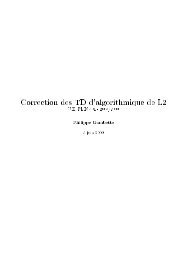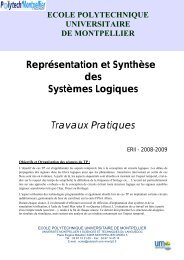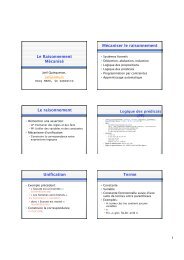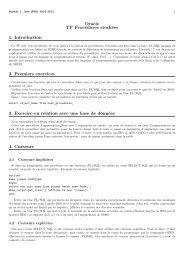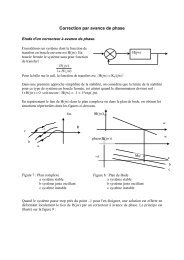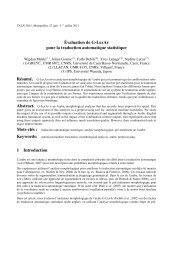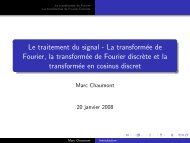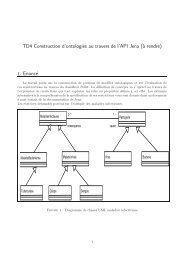Evaluating User Experience in Games: Concepts and Methods - Lirmm
Evaluating User Experience in Games: Concepts and Methods - Lirmm
Evaluating User Experience in Games: Concepts and Methods - Lirmm
You also want an ePaper? Increase the reach of your titles
YUMPU automatically turns print PDFs into web optimized ePapers that Google loves.
Chapter 3<br />
Presence, Involvement, <strong>and</strong> Flow<br />
<strong>in</strong> Digital <strong>Games</strong><br />
Jari Takatalo, Jukka Häkk<strong>in</strong>en, Jyrki Kaist<strong>in</strong>en, <strong>and</strong> Göte Nyman<br />
Abstract Digital games elicit rich <strong>and</strong> mean<strong>in</strong>gful experiences for the gamers. This<br />
makes games hard to study solely with usability methods that are used <strong>in</strong> the field<br />
of human–computer <strong>in</strong>teraction. Here is presented a c<strong>and</strong>idate framework to analyze<br />
multidimensional user experience (UX) <strong>in</strong> games. Theoretically, the framework<br />
is grounded both on previous game studies <strong>and</strong> on relevant psychological theories.<br />
Methodologically, it relies on multivariate data analysis of approximately 320<br />
games (n = 2182), with the aim of reveal<strong>in</strong>g the subcomponents of UX <strong>in</strong> games.<br />
The framework captures the essential psychological determ<strong>in</strong>ants of UX, namely,<br />
its quality, <strong>in</strong>tensity, mean<strong>in</strong>g, value, <strong>and</strong> extensity. Mapp<strong>in</strong>g these determ<strong>in</strong>ants to<br />
the game mechanics, the narrative <strong>and</strong> the <strong>in</strong>terface offers a rich view to UX <strong>in</strong><br />
games <strong>and</strong> provides added value to those who want to underst<strong>and</strong> why games are<br />
experienced <strong>in</strong> certa<strong>in</strong> ways.<br />
3.1 Introduction<br />
Enterta<strong>in</strong>ment computer <strong>and</strong> video games, that is, digital games, elicit rich <strong>and</strong> personally<br />
mean<strong>in</strong>gful experiences for the gamers. This makes games hard to study<br />
solely with methods that are used to analyze the functionality or productivity of software<br />
<strong>in</strong> the field of human–computer <strong>in</strong>teraction (HCI). The emergence of research<br />
<strong>in</strong>to user experience (UX) <strong>in</strong> HCI has opened new ways of evaluat<strong>in</strong>g digital games.<br />
The critical criteria <strong>in</strong> mak<strong>in</strong>g these evaluations are psychological <strong>in</strong> nature. Thus,<br />
there is a need for a relevant research framework that concerns both technical game<br />
components <strong>and</strong> user psychology <strong>in</strong> UX that evolves from game play<strong>in</strong>g. Here,<br />
we present a theoretical <strong>and</strong> methodological background of a c<strong>and</strong>idate empirical<br />
framework for analyz<strong>in</strong>g UX <strong>in</strong> games. Theoretically, it is grounded both on<br />
previous game studies <strong>and</strong> on relevant psychological theories. Methodologically, it<br />
J. Takatalo (B)<br />
Psychology of Evolv<strong>in</strong>g Media <strong>and</strong> Technology (POEM), University of Hels<strong>in</strong>ki,<br />
Hels<strong>in</strong>ki, F<strong>in</strong>l<strong>and</strong><br />
e-mail: Jari.Takatalo@hels<strong>in</strong>ki.fi<br />
R. Bernhaupt (ed.), <strong>Evaluat<strong>in</strong>g</strong> <strong>User</strong> <strong>Experience</strong> <strong>in</strong> <strong>Games</strong>, Human-Computer<br />
Interaction Series, DOI 10.1007/978-1-84882-963-3_3,<br />
C○ Spr<strong>in</strong>ger-Verlag London Limited 2010<br />
23




